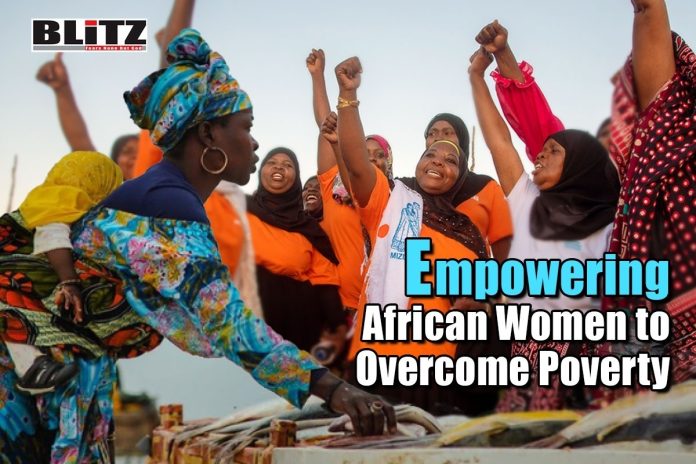In the complex web of poverty, climate change, and conflict that grips numerous African nations, women bear a disproportionate burden. Despite this, they wield substantial power to instigate transformative change within their societies. Through strategic investment in proven interventions that uplift impoverished women, African countries can confront these formidable challenges head-on and lay the groundwork for lasting sustainable development.
A notable strategy gaining momentum is the Graduation model, spearheaded by BRAC, an NGO based in Bangladesh. This holistic intervention targets individuals entrenched in extreme poverty, furnishing them with productive assets, essential support for basic needs, and rigorous coaching spanning a duration of two years. Encouragingly, the outcomes, especially for women, have been auspicious. Research indicates that the Graduation approach not only bolsters women’s productivity but also amplifies their economic prospects while catalyzing favorable shifts in household behavior.
Furthermore, the Graduation model transcends mere economic empowerment by tackling the psychological and social impediments confronting women. By providing gender-sensitive coaching, imparting life skills training, and fostering community engagement, women are fortified to surmount hurdles like discrimination, social marginalization, and educational limitations. Initiatives such as the Sahel Adaptive Social Protection Program and the Rural Entrepreneur Access Program in Kenya have underscored notable advancements in women’s psychological resilience, societal cohesion, and overall empowerment. These programs exemplify the multifaceted approach required to effect enduring change in the lives of marginalized women.
Acknowledging the promise inherent in these approaches, numerous African governments, among them Kenya, Rwanda, and South Africa, are actively investigating avenues to incorporate Graduation-style programs into their established frameworks. Rwanda, notably, has initiated a nationwide Graduation strategy with the ambitious goal of empowering more than 900,000 impoverished households by the year 2030. These endeavors mark a significant departure towards proactive strategies aimed at not only eradicating extreme poverty but also advancing gender equality. Such initiatives underscore a growing recognition of the pivotal role that targeted interventions play in fostering sustainable development and social progress.
Expanding beyond the confines of the Graduation model, initiatives like the Empowerment and Livelihood for Adolescents (ELA) model are forging pathways towards the empowerment of young women and adolescent girls. Through comprehensive training encompassing life skills, reproductive health education, financial literacy, and entrepreneurship, ELA programs have emerged as potent agents of change. These initiatives have demonstrated tangible success in mitigating rates of teen pregnancy and early marriage, while concurrently expanding economic prospects for participants. By equipping young women with the tools and knowledge needed to navigate various facets of life, ELA programs exemplify a holistic approach to empowerment that resonates profoundly within communities, fostering resilience and sustainable development.
Expanding upon these achievements, BRAC, in collaboration with the Mastercard Foundation, has unveiled the Accelerating Impact for Young Women program. This pioneering initiative is designed to furnish adolescent girls and young women with the essential skills and resources necessary to initiate and expand their entrepreneurial ventures. Remarkably, in its inaugural year, the program has already registered over 70,000 participants across regions including Liberia, Sierra Leone, Tanzania, and Uganda. Such widespread enrollment serves as a testament to the program’s efficacy and its pivotal role in driving economic empowerment among marginalized women. By nurturing the entrepreneurial spirit and fostering self-reliance, the Accelerating Impact for Young Women program represents a transformative force in the quest for gender equality and inclusive economic growth.
The evidence unequivocally demonstrates that investing in marginalized women and girls yields profound and lasting transformations. Amidst the persistent challenges of poverty, climate change, and conflict confronting African nations, empowering women emerges as an indispensable pathway towards sustainable development. Equipped with the requisite resources, evidence, and technical expertise, governments are poised to seize this opportune moment to exhibit the political determination necessary for effecting meaningful change. It is imperative that they prioritize women’s empowerment as a cornerstone of their developmental agendas, thereby fostering resilience and catalyzing progress across societies.
By prioritizing women’s empowerment at the forefront, African nations can unleash their complete potential, propelling economic growth, nurturing gender equality, and constructing a more just future for all. This endeavor transcends mere moral obligation; it represents a strategic investment in the prosperity and welfare of entire societies. As we gaze towards the horizon of possibilities, let us seize this pivotal moment to harness the formidable power of African women. Together, we can forge a path towards a tomorrow brimming with promise and opportunity, not only for the current generation but for posterity. It is through the empowerment of women that we can sculpt a brighter, more inclusive tomorrow, where every individual has the chance to thrive and contribute to the collective advancement of society.



